What’s so special about Cocoa Butter?
I strongly believe that nature’s treasures hold the key to radiant, healthy skin.
When I moved to South Africa I tried a few cosmetic brands. Having used pure and 100% natural products on my skin and hair all my life (Shea Butter, Cocoa Butter and African Black Soap), I couldn’t find suitable products that properly nourished my skin and hair.
Most of them were imported, not natural, and low quality.
When I looked at the ingredients, even though some had natural ingredients like Shea Butter and Cocoa Butter but the percentages were low and sometimes they are processed.
In my formulations I only add Cocoa Butter sources from Ghana to skincare products for face and body.
It has amazing benefits for improving skins elasticity, provides the skin with deep moisture and healing properties for damaged skin. We don’t sell it raw/pure because it gets very hard unlike Shea Butter which easily melts at the body’s temperature.
Cocoa butter benefits for skin
Cocoa butter is a natural ingredient with various benefits for the skin:
-
Moisturisation: It’s an excellent emollient, deeply hydrating the skin, making it softer and more supple.
-
Healing Properties: Cocoa butter contains antioxidants and fatty acids that can help repair and heal damaged skin, such as dry, cracked, or chapped skin.
-
Stretch Mark Prevention: Regular use during pregnancy or weight fluctuations may help prevent or reduce the appearance of stretch marks.
-
Skin Smoothing: It can improve skin texture by reducing roughness and promoting a smoother complexion.
-
Anti-Aging: Cocoa butter’s antioxidants can combat the signs of aging, such as fine lines and wrinkles, while maintaining skin elasticity.
-
Sun Protection: While not a replacement for sunscreen, cocoa butter has a natural SPF of about 6, offering some protection against UV rays.
-
Scarring: It may help fade scars and blemishes over time due to its skin-healing properties.
-
Soothing: Cocoa butter can soothe irritated or sensitive skin, making it suitable for conditions like eczema or dermatitis.
- Non-Comedogenic: It’s typically non-comedogenic, meaning it’s less likely to clog pores, making it suitable for various skin types.



